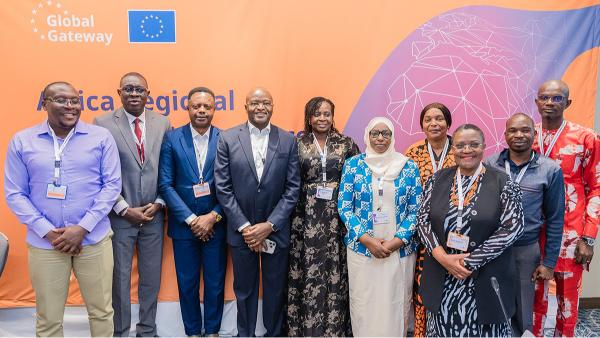 Delegates at the Africa Regional Centres of Excellence (ArcX) forum happening in Nairobi this week to explore how science, innovation and technology can conserve Africa’s forests, biodiversity & ecosystems. Photo by Kelvin Muchiri/CIFOR-ICRAF
Delegates at the Africa Regional Centres of Excellence (ArcX) forum happening in Nairobi this week to explore how science, innovation and technology can conserve Africa’s forests, biodiversity & ecosystems. Photo by Kelvin Muchiri/CIFOR-ICRAFEnvironmental experts are calling for stronger evidence-based policymaking, research collaboration and knowledge sharing to safeguard Africa’s forests, biodiversity and ecosystems.
The group included policymakers, researchers, donors, regional institutions, civil society and private sector representatives from across Africa and Europe.
They met last week in Nairobi for the annual Africa Regional Centres of Excellence (ArcX) forum, organised under the European Union (EU)–Africa partnership to explore how science, technology and innovation (STI) can drive Africa’s green transition and sustainable development.
The call for coordinated, data-driven and agroecology-informed approaches comes as Africa seeks to balance economic growth with environmental sustainability.
“We believe that through science, technology and innovation, we can address the most pressing challenges of our time. We can build stronger connections, foster deeper collaboration and create lasting impact,” deputy head of the European Union Delegation in Kenya Ondrej Simek said.
Speakers stressed the need for African governments, research institutions and development partners to adopt a more integrated and coordinated approach to managing biodiversity and ecosystems spanning forests, water bodies, vegetation and wildlife.
Robert Nasi, director of science at Cifor-Icraf, warned that Africa is losing its forests at an alarming rate, with severe economic consequences.
“The result is rising unemployment, desertification, the loss of habitats for countless species, declining biodiversity and damage to the tourism sector, a major contributor to our economies,” he said.
“The
irony is that we are getting better at monitoring the crisis with satellites,
observatories and advanced tools, yet action still lags behind. We must move
from simply observing to truly acting, because the economic cost of inaction is
staggering.”
Mahaman Saley, science and technology specialist at the African Union Commission, said Africa is rich in potential and natural resources.
“But potential alone is not enough. We must harness science, technology and innovation to address climate change, biodiversity loss, food security, energy access and ocean and coastal management. Science and technology are no longer luxuries, they are essential,” Saley said.
Experts also noted that Africa’s ecosystems are deeply interconnected.
“Forests regulate water cycles that sustain wetlands and rivers, healthy vegetation supports wildlife, and pollinators are critical for agriculture. When one part of this system is weakened, the entire network of life is affected,” they added.
Peter Minang, Africa director for Cifor-Icraf, stressed that economies depend on the balance of natural resources.
“If our forests disappear and water resources are lost, then food security, development and economic growth will all be undermined,” he said.
“We are already experiencing the impacts of climate change, including prolonged droughts and erratic rainfall. The only way to address these challenges is through the sustainable management of our forests, ecosystems, biodiversity and water resources collectively.”
Participants said farming systems must work in harmony with nature.
“By improving soil health, enhancing water retention and reducing dependence on chemical inputs, practices such as intercropping, agroforestry and the use of native species can restore biodiversity while boosting food production and resilience to climate shocks,” they said.
“In Africa, where farming is the dominant land use, agroecology has the potential to transform agriculture into a driver of both ecosystem health and rural prosperity.”
Saley stressed the need to bridge the gap between science and policy.
“Too much of our research remains within universities and fails to reach policymakers. It is time to ensure that scientific evidence informs decisions for Africa’s future,” he said.












